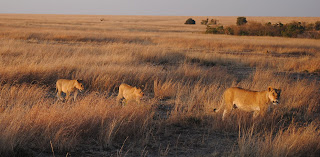The term "Great Migration" refers to the annual movement of 1.3 million wildebeests, 360 thousand gazelles, and 200 thousand zebras North from the Serengeti to the Mara in June and July, then back south again in August and September. It's hard to wrap your mind around numbers like this - but when you look out over the grasslands and see herds of wildebeest and zebra as far as the eye can see, it starts to hit you how vast the amount of animals moving together is. From a high point they look like swarms of ants covering the ground, but after moving closer you realize that each "ant" is a 500 pound wildebeest!
 The drama of the Migration reaches a climax when the herds of animals are faced with a river to cross, bringing along with it fears of drowning in currents or being eaten by crocodiles - fears that the animals seem to know all too well. Some people come to Kenya and spend days fruitlessly trying to observe a crossing, but on our second day in the park, we drove to the Mara River and had the awesome blessing of getting to see two separate crossings only an hour or so apart. First we drove up to the top of a hill to scout out where the animals were gathering, and then placed ourselves next to the river where we could see the action. As if they shared one mind, a group of about 500 wildebeests all began to push one another towards the edge of a 40-foot gorge, with the 200-foot wide river waiting at the bottom. We could see the animals get more and more agitated, scrambling down the dusty cliff then climbing back up, making all sorts of noises and raising a huge cloud of dust. After about fifteen minutes of this, one wildebeest leaped into the water and started bounding and swimming across, fighting the current to climb out on the steep rocks of the other bank as quickly as he could. As soon as one entered the water, it was like a dam had been opened - wildebeests began to stream down the cliff and jump into the river, fighting to cross as quickly as they could and producing an impressively loud cacophony of splashes and grunts. This spectacle went on for about 10 solid minutes, and while we didn't see a crocodile kill this time, we were all left breathless by the enormity of what we had seen.
The drama of the Migration reaches a climax when the herds of animals are faced with a river to cross, bringing along with it fears of drowning in currents or being eaten by crocodiles - fears that the animals seem to know all too well. Some people come to Kenya and spend days fruitlessly trying to observe a crossing, but on our second day in the park, we drove to the Mara River and had the awesome blessing of getting to see two separate crossings only an hour or so apart. First we drove up to the top of a hill to scout out where the animals were gathering, and then placed ourselves next to the river where we could see the action. As if they shared one mind, a group of about 500 wildebeests all began to push one another towards the edge of a 40-foot gorge, with the 200-foot wide river waiting at the bottom. We could see the animals get more and more agitated, scrambling down the dusty cliff then climbing back up, making all sorts of noises and raising a huge cloud of dust. After about fifteen minutes of this, one wildebeest leaped into the water and started bounding and swimming across, fighting the current to climb out on the steep rocks of the other bank as quickly as he could. As soon as one entered the water, it was like a dam had been opened - wildebeests began to stream down the cliff and jump into the river, fighting to cross as quickly as they could and producing an impressively loud cacophony of splashes and grunts. This spectacle went on for about 10 solid minutes, and while we didn't see a crocodile kill this time, we were all left breathless by the enormity of what we had seen. Later that afternoon I started thinking about how interesting the preparation for the crossing had been. Even though there were hundreds of animals that all seemed to badly want to go across the river, they spent a long time milling around, afraid to take the first leap. It only took one wildebeest entering the water, though, before the whole herd found the courage to jump into the dangerous current and move across the river en masse. This made me think about how often many of us might know something is wrong or needs to change, or we might all want to take some step of faith, but in many cases no one will move until one person steps out alone and takes a stand. Maybe it takes the first wildebeest to prove to the other ones that they can live through the water, or maybe it takes the first wildebeest to show that there even IS another option besides staying on the bank. Regardless, it is obvious that the action of one individual can prompt a gigantic response in the larger group for a herd of wildebeest - I think it's the same for us...
Later that afternoon I started thinking about how interesting the preparation for the crossing had been. Even though there were hundreds of animals that all seemed to badly want to go across the river, they spent a long time milling around, afraid to take the first leap. It only took one wildebeest entering the water, though, before the whole herd found the courage to jump into the dangerous current and move across the river en masse. This made me think about how often many of us might know something is wrong or needs to change, or we might all want to take some step of faith, but in many cases no one will move until one person steps out alone and takes a stand. Maybe it takes the first wildebeest to prove to the other ones that they can live through the water, or maybe it takes the first wildebeest to show that there even IS another option besides staying on the bank. Regardless, it is obvious that the action of one individual can prompt a gigantic response in the larger group for a herd of wildebeest - I think it's the same for us...
ps - click here for many more pictures from this trip to the Mara







No comments:
Post a Comment